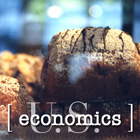
| WHAT IS A "FREE" MARKET? 12 May 2003 It is often said that the cornerstone of globalization is the "opening-up" of "free markets", but the public has had little direct access to the instruments of this revolution in international trade. The term "free" market would seem to espouse the fundamental belief in a pragmatic, liberal-democratic capitalism, favoring the rights of individuals, and serving the interests of nations by keeping prices low and prosperity high. But is the current regime of free trade producing the desired (or professed) results? Like so many questions of its kind, this quickly becomes a question of media-transparency. A common critique of mass media has been that the new model of reportage centers mainly on relaying quotes and arguments, making no informed comment and conducting little research. So it is the decision-makers who explain their own actions, even as conservatives and progressives unite to question the wisdom of overriding Constitutional processes in the interests of faster "free" trade policy-making. In light of this tendency toward the Executive decision-maker, the current regime of free trade has meant more precisely freeing private interest from governmental control. That includes the elimination of protections against capital flight, economic aggression, and monopolization. The fierce competition that emerges in such open markets has in most cases promoted preliminary negotiation between governments and businesses. This means that proponents of free trade have most often been the same figures interested in settling long-term de-regulated contracts even before the opening of a given market, thus eliminating any benefits that might emerge from opening a local market. This doesn't mean that free trade can't happen; nor does it mean that free trade can't be fair. According to theories of sustainable development and democratic economics, the above critique means that the approach to opening markets has to take into account the long-term sustainability of the economy that is being exposed to outside pressures, lest the entire prosperity of that market become entangled in a handful of narrow interests or else flee the geographical zone altogether. It means that governments, and investors, must consider the concept of liberty more broadly, even where it means that the freedom of the marketplace may make competition more formidable. If, for example, the purpose of opening developing markets to freer trade principles is precisely that: to reduce barriers to international trade, then is it not necessary to balance the promotion of trade itself with the promotion of real civil structures within which a truly democratic population can gain access to the tools of the marketplace? |
|||||||
|
||||||||

